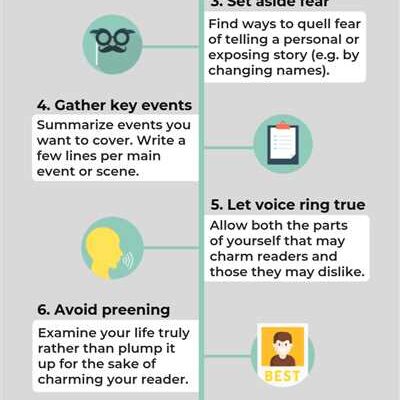
If you’re reading this article, chances are you’ve had an incredible life experience that you want to share with the world. Writing a memoir is a great way to immortalize your stories and preserve your legacy. It’s a chance to delve into your past and bring to life the people and events that have shaped you into the person you are today.
Before you dive into the writing process, it’s important to consider the structure of your memoir. Unlike a fictional book, your memoir needs to follow the real events and experiences of your life. However, that doesn’t mean you’re limited to a strict chronological order. In fact, many successful memoirs take a more thematic approach, jumping back and forth in time to highlight key moments and insights.
One of the most important aspects of writing a memoir is finding your voice as a writer. You’re not just telling a story – you’re telling your story. This means that you need to write in a way that reflects your personality, your view on life, and your unique experiences. Don’t be afraid to let your true self shine through in your writing. After all, readers are drawn to memoirs because they want to get to know the real you.
Another key point to remember is that writing a memoir is different from writing an email or a letter. While those forms of writing might be more casual and conversational, a memoir has literary aspirations. Your goal as a writer is not just to convey information, but to touch your readers on a deeper emotional level. To achieve that, you’ll need to infuse your writing with vivid descriptions, compelling dialogue, and introspective reflections.
Finally, it’s important to note that a memoir is not a tell-all or a venting session. While it’s natural to have some negative experiences or difficult characters in your life, your memoir should be more than just a laundry list of grievances. Instead, focus on the lessons you’ve learned, the growth you’ve experienced, and the moments of joy and triumph. That doesn’t mean you should shy away from the truth – but rather, find a balance between honesty and compassion.
Now that you have a starting point, it’s time to dive into your writing adventure. Remember, there’s no one right way to write a memoir – it’s a deeply personal process that will be unique to you. Use the tips and principles outlined here as a guide, but ultimately, trust your instincts and write from the heart. The world is waiting to hear your story, so don’t wait any longer – pick up your pen and start writing your memoir now!
How to Write Memoir
Writing a memoir can be a challenging and rewarding experience. It allows you to delve into your past and share your unique story with others. However, it’s important to approach the process with care and follow a few guidelines to ensure that your memoir is both engaging and authentic.
1. Find your point of view: Before you start writing your memoir, it’s essential to determine the perspective from which you want to tell your story. Are you going to write it from a first-person perspective, or will you take a more objective approach? Choose the point of view that best suits your story and stick with it throughout.
2. Be honest and truthful: While a memoir is based on your personal experiences, it doesn’t mean you can manipulate the truth to make the story more exciting. Readers can sense when something doesn’t ring true, so it’s important to present the facts as accurately as possible.
3. Tell a story: A memoir should read like a story, with a clear beginning, middle, and end. It should have a narrative arc that takes the reader on a journey. Ensure that your memoir follows a logical progression and keep the reader engaged with compelling anecdotes and well-developed characters.
4. Don’t be afraid to touch on sensitive topics: While it’s understandable to feel apprehensive about revealing certain aspects of your life, a memoir is an opportunity to explore and share your truth. If a particular experience has shaped you as a person, it’s worth including in your memoir. However, be sensitive to the feelings of others involved in your story and seek their permission if necessary.
5. Write for yourself, but also consider your audience: While writing a memoir is a personal endeavor, it’s important to keep in mind that it will be read by others. Consider who your target audience is and write with them in mind. Find a balance between staying true to yourself and crafting a story that will appeal to your readers.
6. Seek feedback and revision: Writing a memoir is a process that requires multiple drafts and revisions. Once you’ve finished your initial draft, seek feedback from trusted friends, family members, or writing groups. Their insights can help you improve your memoir and make it more engaging for readers.
7. Read other memoirs: To become a better memoir writer, it’s important to read works by other memoirists. Study their techniques, writing styles, and storytelling methods. This will not only help you improve your writing but also give you a better understanding of what works in the genre.
8. Write regularly and set goals: Writing a memoir is a significant undertaking, and it can be easy to get overwhelmed. Break the process down into manageable tasks and set specific goals for yourself. Whether it’s writing a certain number of words per day or completing a chapter within a week, having clear goals will help you stay on track.
9. Embrace the power of reflection: Writing a memoir is more than just recounting events; it’s an opportunity for self-reflection and growth. Take the time to reflect on your experiences as you write, and consider the lessons you’ve learned throughout your life. This introspection will add depth and meaning to your memoir.
10. Don’t compare yourself to others: Every writer’s journey is unique, and it’s important not to compare your progress or success to others. Stay focused on your own writing process and celebrate your accomplishments along the way. Remember, the most important thing is to finish your memoir and share your story with the world.
In conclusion, writing a memoir is a complex but rewarding endeavor. Follow these guidelines, and you’ll be on your way to creating a compelling and authentic account of your life experiences.
How to write a memoir
Writing a memoir is a deeply personal and introspective process. It allows you to reflect on the significant moments, experiences, and people in your life. Whether you’re an aspiring writer or simply want to document your life story, here are some tips to help you get started on your memoir:
1. Find your truth: A memoir is not an autobiography. It’s about capturing the essence of your experience, rather than simply listing the events of your life. Be honest with yourself and dive deep into your memories to uncover the emotions and lessons that shaped you.
2. Determine your point of view: Consider the perspective from which you want to tell your story. Will you be the main character, or will you take a more observational role? Decide which approach will best serve the purpose of your memoir.
3. Create a narrative structure: A memoir needs a clear and coherent structure to guide the reader through your story. Consider using a chronological order or exploring themes and motifs that connect different moments of your life. A well-defined structure will make your memoir more engaging and easier to follow.
4. Choose the right tense: Decide whether to write your memoir in the past tense or present tense. Both have their advantages and can create different effects. The past tense may offer a more reflective tone, while the present tense can bring immediacy to the narrative.
5. Don’t be afraid to touch on difficult subjects: Your memoir should be a place of honesty and vulnerability. Don’t shy away from discussing challenging or uncomfortable experiences. By confronting these moments, you can offer a more complete and authentic view of your life.
6. Follow a literary style: While a memoir is based on real experiences, it can benefit from employing literary techniques. Use descriptive language, vivid imagery, and well-crafted dialogue to bring your story to life. A well-written memoir can read like a compelling novel.
7. Get feedback: Share your writing with trusted friends, family, or writing groups. Their feedback can provide valuable insights and suggestions for improvement. Constructive criticism will help you refine your memoir and make it the best it can be.
8. Stay true to yourself: Remember that your memoir is your own story. Don’t feel pressured to adhere to certain conventions or write in a way that doesn’t feel authentic to you. Stay true to your voice and let your unique experiences shine through.
In conclusion, writing a memoir is a rewarding journey that allows you to explore your life in a meaningful way. Follow these tips, stay focused, and keep writing. Your memoir has the power to capture and preserve your experiences for yourself and future generations to cherish.
Finishing Off
As you finish writing your memoir, it’s important to keep in touch with the truth of your experience. This doesn’t mean that every detail has to be 100% accurate or in line with real events, but the overall essence and emotional truth should be captured in your book.
One of the ways to ensure that the truth shines through is by using the present tense to describe your experiences. Writing in the present tense can make your memoir feel more immediate and engaging for the reader.
Another helpful way to structure your memoir is by placing yourself as the main character. By doing this, you will guide the reader through your journey and allow them to view the events from your perspective. Remember to write from the point of view that best represents your story and the message you want to convey.
Now, as you reach the finishing point of your memoir, it’s time to find the most suitable ending. This can be done in various ways – you could leave the reader with a closing thought or reflection, or perhaps provide a hint at what the future holds for you. What you choose will depend on your personal preference and the overall tone of your memoir.
Once you’re done writing, it’s a good idea to get feedback from others. Share your memoir with trusted friends, family, or writing groups to get their perspective. Their input can help you identify any areas that need improvement and provide suggestions for refining your story.
After incorporating the feedback, take some time away from your memoir. Give yourself a break and then come back to it with fresh eyes. This will allow you to view your work in a new light, making it easier to identify any areas that still need attention.
When it comes to finishing off your memoir, don’t be afraid to seek help from literary sources. There are numerous books, online resources, and writing guides that can provide valuable insights and tips on how to polish and refine your work.
Remember, your memoir is a personal endeavor, and there is no one-size-fits-all approach. Follow your own instincts and trust your writing process. By staying true to yourself and your story, you will create a memoir that is unique and captivating.
Get In Touch
Writing a memoir is an incredible journey that allows you to document your unique experiences and share them with the world. It’s a way to immortalize yourself and the characters that have shaped you into who you are today.
But writing a memoir isn’t always easy. There are so many ways to approach it, and it’s easy to get overwhelmed. Don’t worry, we’re here to help guide you through the process.
One of the most important aspects of writing a memoir is finding your voice and staying true to your own unique perspective. Your book should reflect your thoughts and feelings, and the truth as you see it. Don’t be afraid to let your personality shine through!
When it comes to the structure of your memoir, there are no hard and fast rules. Some writers prefer a chronological approach, while others like to jump around in time. Some choose to focus on specific themes or moments in their life. The choice is yours.
Another important consideration is the tense in which you’ll write. Will you tell your story in present tense, making it feel more immediate? Or will you opt for past tense, allowing yourself to reflect on the events that have shaped you? It’s up to you to decide which approach best suits your needs.
As you write, it’s essential to stay connected to your own emotions and experiences. Tap into the memories and feelings that will bring your story to life. This will help your readers connect with you on a deeper level.
Throughout the writing process, it’s also important to reach out for help and support. Your friends and family can provide valuable feedback and encouragement along the way. You can also seek out literary communities or writing groups who can offer guidance and advice.
When you’re ready to share your memoir with the world, there’s no better place to start than right here. Get in touch with us via email, and we’ll be happy to guide you through the publishing process. We can help you find an editor, design your book cover, and take care of all the other details that go into creating a beautiful memoir.
Remember, writing a memoir is a deeply personal journey, but that doesn’t mean you have to do it alone. We’re here to support you every step of the way. So don’t hesitate, get in touch with us now and let’s bring your story to life!
Book your place now →
Writing your memoir is an incredible experience that allows you to delve into your past and explore your life’s most meaningful moments. It’s a chance to reflect on your journey, share your unique story, and leave a tangible legacy for future generations.
But where do you start? How do you structure your memoir in a way that captures the reader’s attention and keeps them hooked from start to finish? How do you find the right tone and voice to convey the essence of your character and experiences?
Here’s a guide to help you book your place in the world of memoir writing. It doesn’t matter if you’re a seasoned writer or someone who has never put pen to paper before. This guide is here to assist you, step by step, in bringing your memoir to life.
First and foremost, it’s important to find your unique point of view. What makes your story different from others? What is the main theme or message you want to convey? Identifying the core of your memoir will guide your writing process and bring focus to your narrative.
Next, consider the structure of your memoir. Will you follow a chronological order, starting from the beginning and moving towards the present? Or will you opt for a more literary approach, jumping back and forth in time to explore certain events or themes? Think about what best serves your story and engages your readers.
Remember that a memoir is not just a factual account of events; it’s a reflection of your inner thoughts and emotions. Connect with your readers on a deep level by sharing your feelings and being vulnerable. Show them the real you, without holding back.
As a writer, it’s important to be honest and true to your experiences. While it’s tempting to embellish or alter certain details for dramatic effect, it’s crucial to maintain the integrity of your memoir. Your readers will connect with the rawness of your truth.
If you’re feeling stuck or overwhelmed, don’t hesitate to seek help. There are many resources and writing communities out there that can provide guidance and support. Whether it’s attending a memoir writing workshop, joining an online writing group, or hiring a writing coach, reach out and get the assistance you need.
Lastly, don’t forget to take breaks and give yourself time to recharge. Writing a memoir can be an emotional journey, and it’s essential to take care of yourself along the way. Step away from your manuscript when you need to, and remember that finishing your memoir is a marathon, not a sprint.
So, if you’re ready to book your place in the world of memoir writing, start now. Grab a pen and paper or open a new document, and begin to pour your experiences onto the page. The truth of your story and the impact it can have on others is waiting to be shared.
Book your place now and embark on a journey of self-discovery, reflection, and storytelling.
For more information and helpful resources, sign up for our newsletter to stay in touch.
Sources

When it comes to writing your memoir, there are sources that can help guide you. Whether you need assistance with structure, character development, or finding the right tense to tell your story, there are resources available to assist you in your writing journey.
One of the most helpful sources for writing a memoir is getting in touch with your own experiences. Your own truth will provide you with a more authentic and real story that readers can connect with. Without the truth, your memoir may come off as more literary fiction than a true reflection of your life.
Another source that can provide guidance is reading memoirs from other authors. By immersing yourself in the memoir genre, you can find different ways in which authors have approached their own stories. This can help you get a better view of how you want to structure and write your own memoir.
If you’re struggling to find the right starting point or finishing touch for your memoir, there are also online resources and writing communities that can offer support. Websites, forums, and writing groups dedicated to memoir writing can provide valuable feedback and advice to help you along the way.
Email newsletters and online courses can also be helpful sources to get a more in-depth guide on how to write your memoir. These resources can offer step-by-step instructions, tips, and exercises to assist you in transforming your memories into a compelling story.
Remember, writing a memoir is a personal and unique endeavor. While these sources can be helpful, ultimately, it is up to you to find the sources and methods that work best for your own writing process. The most important thing is to stay true to yourself and your story and to write from a place of honesty and authenticity.










